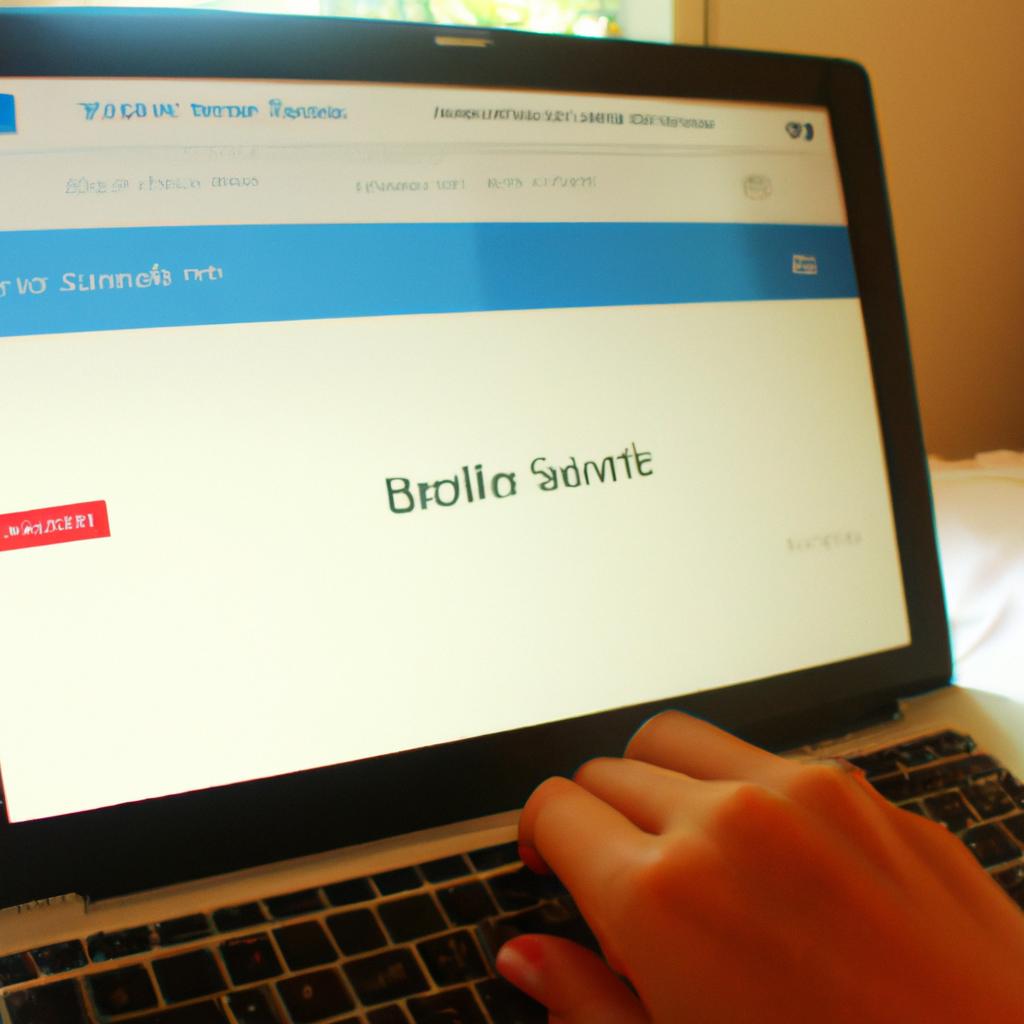Booking Confirmation: A Guide to Hotel Reservations
Imagine this scenario: you have meticulously planned your dream vacation, selecting the perfect destination and mapping out all the exciting activities that await you. The only thing left to do is secure a hotel reservation. However, navigating the process of booking a hotel can be daunting, with numerous factors to consider and potential pitfalls along the way. This article aims to provide a comprehensive guide on booking confirmation for hotel reservations, offering practical advice and insights into ensuring a smooth and hassle-free experience.
In today’s digital age, online platforms have revolutionized the way we make travel arrangements. With just a few clicks, travelers can access an extensive selection of accommodations tailored to their preferences and budgetary constraints. Nonetheless, despite its convenience, reserving a hotel room can sometimes lead to unexpected complications. For instance, imagine making an online booking for your ideal hotel only to arrive at your destination and discover there was no record of your reservation. Such scenarios highlight the importance of understanding the intricacies of booking confirmation processes in order to safeguard against any potential mishaps or disappointments.
This article will delve into various aspects related to booking confirmation for hotel reservations, including different methods employed by hotels to confirm bookings, common challenges faced during the confirmation process, and tips on how to ensure a successful confirmation.
One of the most common methods hotels use to confirm bookings is through email. After making a reservation online or over the phone, it is crucial to provide a valid email address where the hotel can send your booking confirmation. Upon receiving the confirmation email, take the time to review all the details, including dates, room type, and any additional requests you may have made. If you notice any discrepancies or errors, promptly contact the hotel to rectify them before your arrival.
In addition to email confirmations, some hotels also offer instant booking confirmations through their websites or mobile apps. This allows guests to receive immediate confirmation after completing their reservation. However, it is still advisable to double-check all the details in these cases as well.
Another important aspect of booking confirmation is understanding the hotel’s cancellation policy. While no one likes to think about canceling their plans, unforeseen circumstances can sometimes arise that make it necessary. Familiarize yourself with the terms and conditions regarding cancellations and any associated fees before confirming your reservation. It is always better to know in advance what options are available if your travel plans change unexpectedly.
During peak travel seasons or for popular events, hotels may implement stricter policies when it comes to booking confirmations. They might require prepayment or credit card guarantees to secure reservations. Make sure you understand these requirements and fulfill them accordingly to avoid any issues upon arrival.
To further ensure a smooth booking confirmation process, consider calling the hotel directly after making an online reservation. Speaking directly with a staff member can help clarify any doubts or concerns you may have and provide an opportunity for personalized assistance.
Lastly, keep copies of all correspondence related to your hotel reservation – from initial emails confirming your booking to any subsequent conversations with hotel staff. These documents serve as essential evidence should any disputes arise later on.
In conclusion, understanding the intricacies of booking confirmation processes for hotel reservations is crucial for a stress-free travel experience. By following the tips outlined in this guide, you can minimize the chances of encountering any unexpected complications and ensure that your dream vacation starts off on the right foot. Happy travels!
Purpose of Booking Confirmation
To ensure a seamless accommodation experience, hotels often send booking confirmations to guests after they have made a reservation. This section aims to explore the purpose behind these confirmation emails and their significance in maintaining customer satisfaction.
One example that highlights the importance of booking confirmation is Sarah’s recent hotel reservation. After making an online booking for a weekend getaway, she eagerly awaited her trip. However, when she arrived at the hotel, she was informed that there had been a mix-up with her reservation. The front desk staff apologized for the inconvenience caused and managed to find another room available, but it wasn’t what Sarah had originally requested. This incident could have been avoided if Sarah received a proper booking confirmation email that detailed her specific requirements.
Booking confirmations serve several purposes:
- Assurance: A well-crafted confirmation email provides reassurance to guests that their reservation has been successfully processed and acknowledged by the hotel.
- Information: It serves as a comprehensive source of information, containing details such as check-in/out times, room type, amenities included, and any additional services or requests specified during the booking process.
- Clarification: By explicitly stating all terms and conditions related to the reservation, including cancellation policies and payment methods accepted, the guest can be fully aware of their responsibilities and avoid any misunderstandings.
- Peace of Mind: Lastly, receiving a confirmation instills confidence in guests that everything is in order before they embark on their journey.
| Importance of Booking Confirmation |
|---|
| Provides assurance |
| Offers necessary information |
| Helps clarify terms and conditions |
| Gives peace of mind |
In conclusion (sentence transition), booking confirmations are essential tools for both hotels and guests alike. They help prevent potential issues arising from miscommunication or errors while providing customers with valuable information upfront. In our next section (transition into subsequent section), we will delve deeper into the importance of booking confirmation and its impact on guest satisfaction.
Importance of Booking Confirmation
When it comes to hotel reservations, a booking confirmation serves as an essential document that not only provides peace of mind for both the guest and the hotel but also ensures a smooth and hassle-free experience. For instance, imagine a scenario where a traveler arrives at their destination after a long journey, only to find out that their reservation was not properly recorded by the hotel staff. This unfortunate situation could have been easily avoided if a booking confirmation had been sent and acknowledged beforehand.
To further emphasize the significance of booking confirmations, let us explore some key reasons why they are crucial in the world of hotel reservations:
-
Avoiding Misunderstandings: A booking confirmation acts as evidence that clearly outlines all agreed-upon terms between the guest and the hotel. From check-in and check-out dates to room rates and amenities included, this document helps prevent any potential misunderstandings or disputes upon arrival.
-
Ensuring Reservation Accuracy: In today’s fast-paced digital environment, mistakes can happen during data entry or transmission. A booking confirmation allows guests to review their reservation details carefully before arriving at the property, ensuring accuracy in information such as room type preferences or special requests.
-
Guaranteeing Room Availability: Hotels often receive numerous inquiries and bookings on a daily basis. By sending a booking confirmation promptly, hotels secure rooms for their guests well in advance, minimizing the risk of overbooking or having insufficient availability upon arrival.
-
Building Trust and Professionalism: Providing guests with a comprehensive booking confirmation demonstrates professionalism on behalf of the hotel management. It instills confidence in customers by assuring them that their reservation has been received and processed efficiently—a vital aspect when choosing accommodations.
The importance of booking confirmations cannot be overstated; they play an integral role in facilitating seamless interactions between guests and hotels. However, merely acknowledging its significance is not enough—knowing what crucial information should be included within these documents is equally important. In the subsequent section, we will explore key details that should be incorporated into a booking confirmation to ensure an optimal guest experience.
Key Information to Include in a Booking Confirmation
Understanding the significance of booking confirmation is crucial for both hotels and guests. By providing a clear acknowledgment of a reservation, a hotel can ensure that their guest’s expectations are met upon arrival. This section will delve into key information to include in a booking confirmation, highlighting its importance with real-life examples.
Paragraph 1: A well-crafted booking confirmation serves as an assurance to guests that their reservation has been successfully processed and acknowledged by the hotel. For instance, imagine a business traveler named Sarah who books a room at Hotel X for an upcoming conference. Upon receiving her booking confirmation, Sarah feels reassured about her stay and develops confidence in the hotel’s professionalism. The sense of security offered through such communication fosters positive experiences even before arrival.
To further emphasize this point, consider the following emotional responses triggered by an effective booking confirmation:
- Relief: Guests feel relieved knowing their reservation is confirmed.
- Excitement: Anticipation builds as guests receive details about their stay.
- Trust: Confidence in the hotel increases when transparent policies are outlined.
- Appreciation: Acknowledgment enhances guest satisfaction and loyalty.
Paragraph 2:
In order to convey essential information effectively, it is recommended to include specific details within a booking confirmation. Here is an example of what should be included:
| Information | Purpose |
|---|---|
| Guest name | Personalization and verification |
| Reservation dates | Clear timeline for reference |
| Room type | Ensuring correct accommodation allocation |
| Payment details | Transparency regarding charges |
Including these particulars not only prevents confusion but also showcases attentiveness towards individual needs, thereby enhancing customer experience.
Paragraph 3:
By understanding the importance of booking confirmations, hotels can establish trust and foster positive relationships with their guests right from the start. Through timely acknowledgments that highlight relevant information, hotels create memorable experiences and set the stage for a pleasant stay. In the subsequent section, we will explore best practices for sending booking confirmations to maximize their impact.
With an understanding of the significance of booking confirmation established, let us now delve into the best practices hotels can employ while sending these crucial communications.
Best Practices for Sending Booking Confirmations
Having understood the importance of a booking confirmation, let us now explore the key information that should be included in this communication. To illustrate its significance, consider a scenario where an individual named Sarah books a hotel room for her vacation.
Paragraph 1:
A booking confirmation serves as a vital document that ensures both parties involved have a clear understanding of the reservation details. Firstly, it is essential to include the guest’s name and contact information at the beginning of the confirmation email or letter. This allows hotels to easily identify their guests and assists with any future correspondence regarding the reservation.
Additionally, it is crucial to provide specific dates and times related to check-in and check-out procedures. Including these details not only helps prevent confusion but also enables hotels to manage their occupancy efficiently. Furthermore, it is advisable to mention any special requests made by the guest during the booking process, such as dietary preferences or accessibility requirements. By acknowledging these requests upfront, hotels can strive towards providing personalized experiences for their guests.
- Important elements to include in a booking confirmation:
- Guest’s name and contact information
- Dates and times for check-in and check-out
- Special requests made by the guest
- Any additional terms and conditions
Paragraph 2:
To enhance clarity within a booking confirmation, utilizing bullet points can be effective in presenting key information concisely. For instance:
- Reservation Details:
- Hotel Name: ABC Hotel
- Room Type: Deluxe Double Room
- Check-In Date: July 15th, 2023
- Check-Out Date: July 20th, 2023
By using bullet points like these, hotels can ensure that guests quickly grasp important information without feeling overwhelmed by lengthy paragraphs.
Paragraph 3:
In summary, when crafting a comprehensive booking confirmation, including key details such as guest information, check-in/check-out dates and times, special requests, and additional terms and conditions is crucial. By providing this information clearly and concisely, hotels can establish a solid foundation for an enjoyable guest experience.
Now that we have covered the key information to include in a booking confirmation, let us explore common mistakes to avoid in order to ensure effective communication with guests.
Common Mistakes to Avoid in Booking Confirmations
Transitioning from the best practices for sending booking confirmations, it is essential to be aware of common mistakes that should be avoided. Let’s consider an example scenario where a guest named John recently made a hotel reservation and received a confirmation email. Unfortunately, due to errors in the confirmation, his check-in process was delayed and he experienced frustration upon arrival at the hotel.
To prevent such incidents, here are some key points to keep in mind when crafting your booking confirmations:
- Ensure Accuracy: Double-check all details provided in the confirmation email, including dates, room types, pricing information, and any additional services or requests made by the guest. Inaccurate information can lead to confusion and dissatisfaction upon arrival.
- Be Clear and Concise: Use simple language and avoid industry jargon or complex terms that may confuse guests. Clearly communicate important policies such as cancellation deadlines, payment methods accepted, and any specific instructions regarding check-in procedures.
- Provide Contact Information: Include contact details for your hotel’s front desk or reservations department so that guests can easily reach out if they have any questions or need assistance. Promptly responding to inquiries helps build trust and enhances the overall guest experience.
- Personalize Where Possible: Whenever feasible, personalize the confirmation by addressing guests by name and expressing gratitude for their reservation. This small touch adds a personal element to the communication and makes guests feel valued.
Consider this table illustrating the impact of common mistakes on guest satisfaction levels:
| Mistake | Impact |
|---|---|
| Incorrect room type assigned | Guest may end up with unsuitable accommodations |
| Missing payment details | Confusion during check-out |
| Failure to mention early check-in request | Disappointment if not accommodated |
| Spelling mistakes or grammatical errors | Lack of professionalism |
By avoiding these mistakes and implementing best practices, you can ensure that your booking confirmations are effective in providing guests with accurate information and a positive impression of their upcoming stay. This will set the stage for a smooth check-in process.
With proper attention to detail in crafting booking confirmations, it is now crucial to focus on ensuring a seamless check-in process for your guests.
Ensuring a Smooth Check-in Process
Section 3: Ensuring a Smooth Check-in Process
After avoiding common mistakes in booking confirmations, it is crucial to focus on ensuring a smooth check-in process for hotel guests. Let’s take the example of John, who recently made a reservation at a luxury hotel. Upon arrival, he expected a hassle-free check-in experience but encountered several challenges that could have been prevented with proper preparation.
To avoid such inconveniences, consider the following tips:
-
Provide Clear Instructions: Ensure that your booking confirmation includes clear and concise instructions regarding the check-in procedure. Specify the location of the front desk or reception area, along with any additional information such as required identification or forms to be filled out upon arrival.
-
Streamline Documentation: Simplify the check-in process by utilizing technology to streamline documentation. Offer online pre-registration options so guests can provide necessary details ahead of time, reducing time spent at the front desk. This not only enhances efficiency but also improves guest satisfaction.
-
Efficient Communication Channels: Establish effective communication channels between staff members involved in the check-in process. This helps ensure seamless coordination and minimizes errors or delays during guest arrivals.
Now let’s explore how these strategies can benefit both hotels and their guests through an emotional lens:
| Benefit for Hotels | Benefit for Guests |
|---|---|
| Increased operational efficiency | Reduced waiting times |
| Enhanced guest experience | Convenience and ease of check-in |
| Improved customer satisfaction | Feeling valued and cared for |
| Positive online reviews | Trust and loyalty towards the hotel |
By implementing these measures, hotels create an environment where guests feel welcomed and appreciated from the moment they arrive. It fosters positive emotions like comfort, trust, and satisfaction throughout their stay.
To summarize, taking steps to ensure a smooth check-in process is essential in providing exceptional service to hotel guests. By offering clear instructions, streamlining documentation procedures, using efficient communication channels, and focusing on the emotional impact of these efforts, hotels can improve guest experiences and cultivate long-term customer loyalty.
 Cedars Inn Auburn
Cedars Inn Auburn



